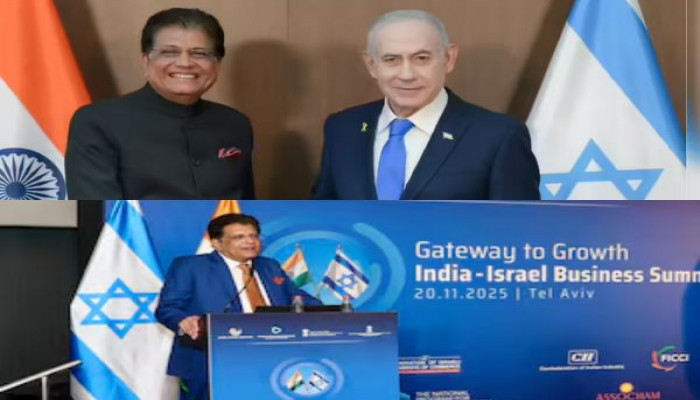India, Israel revive talks on long-pending FTA with focus on strategic cooperation
- In Reports
- 09:39 PM, Nov 24, 2025
- Myind Staff
India and Israel have restarted negotiations for a long-pending Free Trade Agreement nearly ten years after the last formal talks stopped, with experts saying that the main focus should be on strategic cooperation instead of only merchandise trade.
The Global Trade Research Initiative on Monday said that trade between India and Israel remains modest, and the renewed effort should highlight areas such as defence manufacturing, electronics, semiconductors, water and irrigation technology, precision agriculture, cybersecurity, and advanced research and development.
“For both countries, therefore, the value of the renewed FTA effort lies less in merchandise trade and more in strategic cooperation -- in defence manufacturing, electronics, semiconductors, water and irrigation technology, precision agriculture, cybersecurity, and frontier R&D,” GTRI Founder Ajay Srivastava said.
India and Israel first began FTA talks in 2010 and held several rounds of discussions from 2012 to 2013. However, the talks paused after 2014 due to disagreements over tariffs, standards, and access for sensitive products.
After a series of high-level meetings in 2024-2025, both governments have now agreed on new Terms of Reference (ToR) to restart negotiations. Last week, they officially signed these terms, marking the formal return to discussions.
Commerce Minister Piyush Goyal, after his visit to Israel from November 20 to 22, said that the FTA talks may take place in two phases, starting with tariff cuts for goods, followed by a wider agreement that could include investment, technology transfer, defence, space, agri tech, cybersecurity, AI, fintech, research and development, innovation, and drip irrigation systems.
Bilateral merchandise trade between India and Israel remains relatively small at $3.6 billion in the financial year 2025.
India exported goods worth $2.1 billion to Israel, mainly cut and polished diamonds worth $555 million, rice worth $102 million, organic chemicals worth $96 million, ceramic tiles worth $81 million, and aircraft parts worth $54 million.
Imports from Israel totalled $1.5 billion, led by diamonds worth $333 million, electronics worth $ 350 million, including integrated circuits worth $117 million and electronic components worth $66 million, along with fertilisers worth $135 million, insecticides worth $63 million, and machinery worth $91 million.
GTRI said that even with an FTA, Indian exports may not grow much. Israel is a high-income and technology driven market with a population of less than 10 million, and has limited demand for Indian mass market products such as textiles, automobiles, and general engineering goods.
In sectors where India is strong, such as agriculture, generic medicines, steel, and chemicals, Israel is either self-sufficient, heavily regulated with strict quality and phytosanitary rules, or already gives tariff benefits to partners such as the EU and the US.
This puts Indian products at a clear disadvantage.
“As a result, commerce remains concentrated in a few niche categories such as diamonds, rice, and ceramic tiles,” the GTRI brief said.
The think tank added that the real value of the FTA lies in strategic cooperation. Beyond goods trade, both countries are expected to increase collaboration in defence manufacturing, electronics, semiconductors, water and irrigation technology, precision agriculture, cybersecurity, and advanced research and development, where both nations have strengths that complement each other.
With the renewed effort, trade relations between India and Israel are moving towards a stage where the emphasis may shift from modest merchandise trade to larger strategic and technological cooperation, creating a more future-focused partnership.







Comments